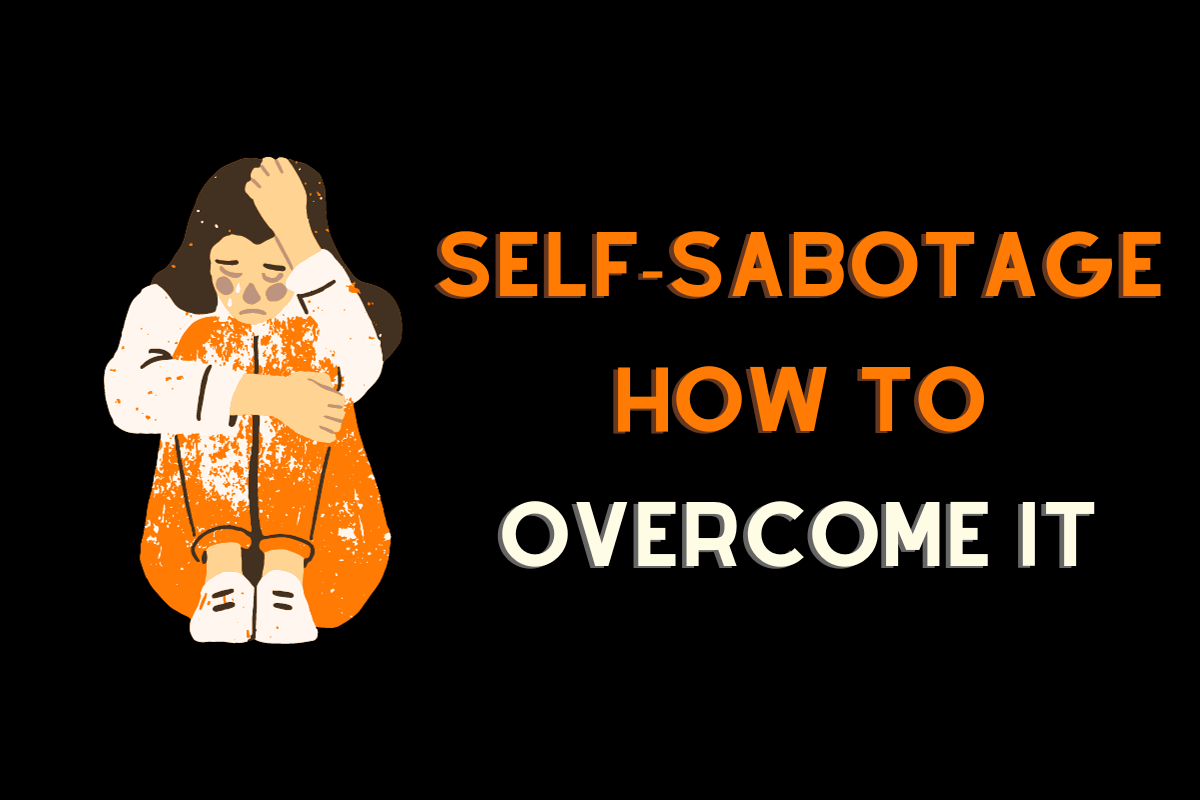Unmasking the saboteur within
Picture this: You set a goal—perhaps it’s to eat healthier, excel at work, or maintain meaningful relationships. You’re pumped up, motivated, and ready to conquer the world. But, as days pass, you find yourself indulging in that extra piece of cake, procrastinating on crucial tasks, or pushing people away. What’s going on?
Enter the subtle yet powerful force of the self-sabotaging self. These unwanted actions are in essence the self-sabotage’s meaning and process. If suddenly you find yourself mindlessly doing what you don’t want, then you can be assured that this is a result of self-sabotaging behavior.
The inner critic: Friend or foe?
At the heart of self-sabotage lies the inner critic. This inner voice can be a valuable guide, offering constructive feedback and steering us away from potential pitfalls.
However, it can also morph into a relentless saboteur, bombarding us with negative thoughts, doubts, and fears that erode our confidence and derail our progress.
Fear of success and failure: A paradox

Self-sabotage is paradoxical. On one hand, we fear failure—nobody wants to fall short of their aspirations. On the other hand, success can be equally terrifying. Achieving our goals may usher in new expectations, responsibilities, or even imposter syndrome.
As a result, we unconsciously thwart our own efforts, creating a safety net that shields us from the potential consequences of both success and failure. Desired or not, our defense mechanisms kick in and attempt to save us from ourselves, which can also mean our achievements.
Comfort in familiarity
Humans are creatures of habit, and the familiar, even if negative, can be strangely comforting. Stepping into the unknown, whether it’s a successful career change or a fulfilling relationship, can trigger anxiety. The comfort of familiarity, even if it’s self-destructive, can lure us into the arms of self-sabotage as a way of maintaining the status quo.
Identifying patterns
Self-sabotage often follows specific patterns. It could manifest as procrastination, perfectionism, self-doubt, or even self-destructive behaviors. Recognizing these patterns is the first step toward dismantling the defense mechanisms of self-sabotage.
Take a step back and observe your own actions—when do you tend to sabotage yourself, and what triggers this response?
The roots of self-sabotage
Childhood conditioning
Our early experiences and upbringing play a pivotal role in shaping our beliefs about ourselves and the world and how to stay protected.
If we were raised in an environment where success was met with criticism or failure was punished, we may develop deep-seated fears that hinder our adult endeavors. Unraveling these early imprints is crucial for understanding and overcoming self-sabotage.
Limiting beliefs
The stories we tell ourselves about our capabilities, worthiness, and potential create the foundation for our reality. Limiting beliefs—those ingrained convictions that we can’t achieve, aren’t deserving, or aren’t good enough—fuel the flames of self-sabotage. Challenging and rewriting these narratives is a powerful antidote.
Imposter syndrome
Feeling like a fraud, despite evidence of competence, is a common manifestation of self-sabotage. Imposter syndrome can lead us to downplay our achievements, shy away from challenges, and undermine our own success. Recognizing that imposter syndrome is a trick of the mind can help us break free from its grasp.
How to stop self-sabotaging

The good news is, we all have the power to change our self-sabotage patterns and the process can be surprisingly simple. The following are seven ways to stop self-sabotage and to reset the not-so functional ways you may operate.
1. Cultivating self-awareness
The process of overcoming self-sabotage begins with self-awareness. Pay attention to your thoughts, feelings, and behaviors without judgment. When you catch yourself engaging in self-sabotaging patterns, pause and ask yourself why. Question what fears or beliefs are driving these actions.
2. Challenge negative self-talk
The inner critic can be relentless, but it’s not infallible. Challenge negative self-talk by questioning its validity. Would you say the same things to a friend facing similar challenges? Probably not. Treat yourself with the same compassion and encouragement you would offer others.
3. Set realistic goals and celebrate mini-win
Unrealistic goals can set the stage for self-sabotage. Break down larger objectives into smaller, achievable steps. Celebrate each milestone, reinforcing a positive feedback loop that counteracts the impulse to sabotage your progress.
And remember that the point is not necessarily reaching a goal, but changing the negative patterns you have somehow developed. Recognize your achievements from the very start and let yourself feel good as soon as you begin to consciously put new wheels in motion.
4. Plan for the pros and cons
Once you become aware of your patterns, you can begin effectively planning for any self-created challenges that may occur.
Set the stage you want to perform in, prep the props you need and make the process as easy for yourself as possible and remember the more you do what you need to do, the more it will become automatic and keep the faith in the fact that consistency will indeed breed confidence.
5. Make “errors” part of the process
Embrace the concept of a growth mindset, where challenges are opportunities for learning and growth. See setbacks not as failures but as stepping stones toward success. This shift in perspective can diminish the fear of failure and encourage perseverance.
When you find yourself reverting to your self-sabotaging habits, despite having done your homework, use the situation as a chance to delve deeper into the reason you may have veered off course and then optimize your drive by tweaking those components.
6. Don’t ever skip twice
Don’t beat yourself up if you fall off the proverbial wagon, especially because you can use that opportunity as a chance to improve upon yourself and processes. But do everything in your power to not skip twice whatever it is you have penned in your schedule to succeed at.
If you do skip twice then it may be time to restart yourself with some sort of healthy self-care practice that like “paying it forward” may feel rewarding, which can lead to inspiring us to do what we need to do to have deserved it.
7. Seek accountability and support
Breaking free from self-sabotage is a challenging endeavor, and you don’t have to go it alone. Reach out to friends, family, or a therapist who can provide guidance, encouragement, positive peer pressure and a fresh perspective.
Sometimes, an external viewpoint can illuminate blind spots we might have missed. And you may just find that the opportunity to hold yourself accountable to others is the ultimate solution you have been seeking.
The self-sabotage antidote is embracing self-compassion
In the intricate dance with self-sabotage, the most graceful moves are often those of self-compassion. Understand that you’re not alone in this struggle; it’s a universal experience. Instead of berating yourself for perceived failures, embrace the journey of self-discovery and cultivate a growth mindset.
Self-sabotage is a formidable opponent, but armed with self-awareness, compassion, and a commitment to personal growth, you can reclaim control over your life.
Remember, the goal isn’t perfection but progress and progress comes from consistent practice. Not only does consistency breed confidence, but the time spent doing what you actually want to do, will recalibrate who you are and suddenly you will find that the backseat driver saboteur has somehow vanished from the car.



